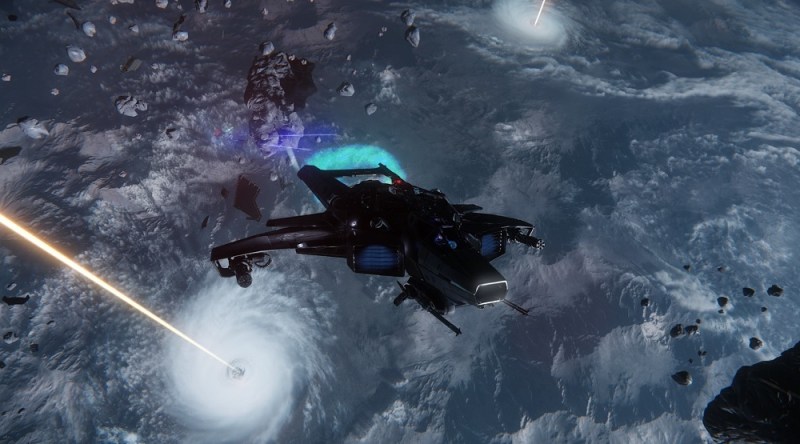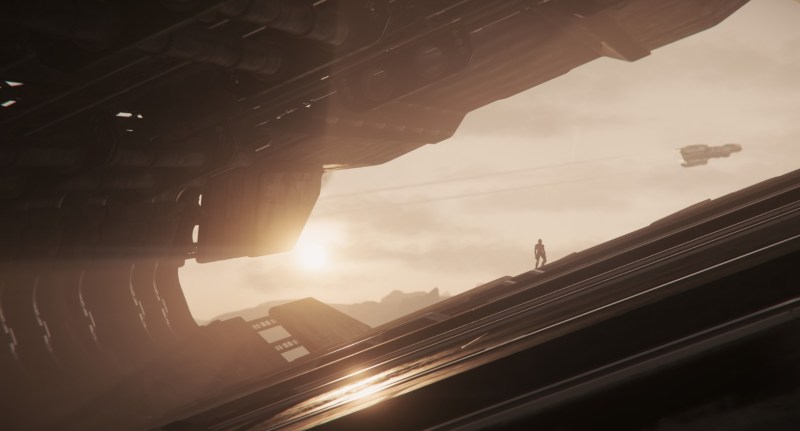GamesBeat: Even with the financials of public companies, like Take-Two and this capitalized software costs thing — it gets a little murky. There’s a lot of mysteries still.
Roberts: Oh, yeah. We went out of our way, in terms of how you treat expenses and capitalized stuff — we wanted to be more like a layman’s style of accounting. Cash in, cash out. We also wanted to be very clear about what goes in terms of development and then what goes in terms of publishing.
I don’t think people understand that we run hundreds of servers in AWS. We have a whole department that has to maintain and run those. We have a community team that manages the community and the forums. We have a player relations team that has to deal with — “Someone came in and stole my game!” There’s a lot of things we do even at an early stage. It’s all what you have to do as a full-on publisher. I think people assume this stuff just magically happens or something.
One thing about doing this — we’re saying, “This is what it costs.” We’re fairly frugal with how we try to do stuff. We have our most headcount in Europe, which is less expensive than in Los Angeles or even Austin, Texas. But even in the U.S. operations, a lot of our online and player relations stuff is in Austin, because that’s a more economical place to do it than, say, Los Angeles. We’re more efficient because we have to be, compared to a big publisher. But it’s useful for people to see what these things cost.
June 5th: The AI Audit in NYC
Join us next week in NYC to engage with top executive leaders, delving into strategies for auditing AI models to ensure fairness, optimal performance, and ethical compliance across diverse organizations. Secure your attendance for this exclusive invite-only event.
From my standpoint, maybe I’m just a bit of a geek about it. I’d love to know more about what Take-Two’s doing, or even how it goes in EA and Activision’s stuff. They’re so big that it’s all rolled up. You don’t get visibility into what they’re really spending on development versus marketing versus online operations or whatever.

Above: Star Citizen’s combat in action.
GamesBeat: On the overall financial picture, it looks like you had to spend a lot of what you’ve raised. There’s not a ton of cushion. You’re not riding very comfortably.
Roberts: The counter, I would say — we have five years of revenue history. That’s where I’d point. We don’t operate — I think everyone thinks, “You had $200 million to go make a game, and you spent it and that’s it.” That’s not the way it is. Every day we bring in money. Every day we have new people joining.
We operate very much like a live product. What we do is every year we forecast what we’ll be doing over the year, and that sets our spending targets. Generally we’ve been incredibly accurate on our forecasts over the last four years. We maybe had two to five percent deviation from our forecasts, which is pretty decent.
Yes, you could say, “You have $20 million in the bank, and that’s only so much for operations.” But there’s not ever been a case where we’ve gone to zero dollars. There’s no history to say we would do that. That’s kind of like me saying — yes, if Electronic Arts didn’t bring in another cent, they’d be out of money in short order, because they have pretty heavy running costs.
We’ve also set it up in a way that, if we’re seeing a drop-off, we’d scale back our development ambition. But we haven’t, so we’ve been planning for that and getting stuff out. We obviously anticipate that when Squadron comes out, that’s going to be a big revenue-positive event for us. We have a bunch of people who’ve backed for Star Citizen and pledged for Squadron, but that game has potential to reach millions more people than our current base.
Our approach was that we wanted to — the money we’re bringing from crowdfunding, we’re committed to spending on the game and development. If we saw a change in that velocity or trajectory of the revenue coming in, we would make an adjustment on our internal development spending. We have a few levers to pull, but we’ve been pretty steady as we’ve gone along. We felt comfortable in our planning on that.
It would be great if we sat on a billion dollars and we could work for 20 years without ever bringing any money in. [laughs] But we won’t be anywhere near there until we release Squadron and get a little further on.
GamesBeat: How do you feel about the valuation, around $500 million? That seems pretty good. In some ways it even seems a little low given what some of your ambition is.
Roberts: We actually did a valuation, an investment bank valuation process. The actual valuation, the paper one, which you’ll always discount, and a private one and all the rest — potentially it could be anywhere from, using comparables and metrics, future events and revenues — it could be $700 million to $1 billion. Our end-up valuation, as you would do for a private one, has a slight haircut to it.
I’m pretty proud that we’ve built a company to this point that’s worth almost half a billion dollars. But I think that if it all works, if Squadron comes out and is big, and then Star Citizen turns into this online universe that people just go to — I’m not going to say it’s World of Warcraft-sized, but it has the potential to be that kind of destination. If it does that, you’re talking about a much bigger number than we’re talking about here.
I’m not saying we’re Fortnite, but Epic just had a $15 billion valuation. You see a lot of other companies with pretty large valuations. If the online basis works, you could be looking at a business that does $300 million, $400 million, $500 million a year, which means you’re much bigger. The margins would be fairly high because it’s an online game. You’d be talking about a pretty valuable business.
Clive and Keith have gotten themselves a good deal, I think, and it’s good for us at this point, because it allows us the flexibility and independence that we wouldn’t have otherwise. For me, I’m seeing the bigger game. I want to be up there with the other big online players. I don’t see any reason why we couldn’t match the Riots of the world and so on.

Above: A derelict Javelin ship in Star Citizen.
GamesBeat: How did some of the thinking go into raising this round? Did you need this for marketing purposes? Does it have to be designated to U.S. costs or U.K. costs, or do you have more free rein to use this money?
Roberts: No, it’s pretty free rein. There are some constraints. I can’t go and buy myself a $50 million yacht with it. [laughs] But both the U.S. and the U.K. companies have issued shares, and it was invested equally there for corporate purposes. The prime thing that we wanted and needed it for was looking forward to the launch of Squadron 42.
As you said, we run fairly tight on the development side. It’s not like we have a lot of free cash sitting around to spend on marketing. We could potentially launch Squadron and be organic about it, but it felt like that wouldn’t be the best way to do it. We’re not planning on trying to compete with the blanket Call of Duty style of marketing, but we’re certainly going to be doing marketing than we do, and do some traditional marketing as well as our typical viral community style of marketing.
What’s nice about this is, we get to do it. We don’t have to partner with someone. We’re a little different from some other crowdfunded games, because of our scale, but a lot of other companies — the Kingdom Come: Deliverance guys, they partnered with Deep Silver to do the actual release of their game. I think inXile and Obsidian, on their side, they did some partnerships for their physical retail beyond fulfilling the crowdfunded stuff.
From our standpoint, that would be leaving money on the table. We’d rather handle it ourselves and be directly in control of our destiny, which is what we’ve done so far already. I would argue we’ve been pretty successful because we’ve done that, so we wanted to keep that and not have to put our destiny, our future, in the hands of a third party. They may do a great job. I don’t know. But it always feels better when you’re in control.

